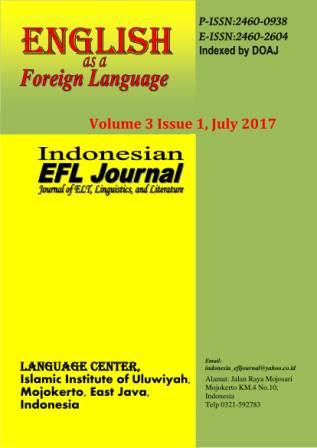Experiential Learning Model in Enhancing Prospective English Teachers` Teaching Competence
Abstract
This study aimed to describe the effectiveness of Experiential Learning (EL) model in improving prospective EFL teachers’ (PETs) teaching competence. The method of this study was Classroom Action Research (CAR) consisting of planning, observing, acting, and reflecting phases. There were two cycles needed in implementing EL to the twenty one EFL learners as the participants. The results revealed that each subcompetence in cycle I and cycle II was achieved in the following score: planning & preparation for learning (Mean in cycle I=2,8; Mean in cycle II=3,38), classroom management (Mean in cycle I=2,5; Mean in cycle II=2,95), delivery of instruction (Mean in cycle I=2,6; Mean in cycle II=2,90), and monitoring, assessment, and follow-up (Mean in cycle I=2,4; Mean in cycle II=2,95). It can be concluded that EL is effective in improving PETs’ teaching competence.
References
Bhat, V. D., Chaudhary, S.V.S., and Dash, N.K. (2008). “Teacher Competence in Higher Educationâ€, http://hdl.handle.net/123456789/24676
Blake, R. (2016). Technology and the four skills. Language Learning & Technology, 20(2), 129–142. Retrieved from http://llt.msu.edu/issues/june2016/blake.pdf (Accessed on October 2nd, 2016)
Borg, S. (2006). Teacher cognition and language education: Research and practice. London: Con- tinuum.
Brosh, H. (1996). Perceived characteristics of the effective language teacher. Foreign Language Annals, 29(2), 125-136. doi: 10.1111/j.1944-9720. 1996.tb02322.x
Clauset, K. H., Lick, D. W., & Murphy, C. U. (2008). Schoolwide action research for professional learning communities: Improving student learning through the whole-faculty study groups approach. Thousand Oaks, CA: Corwin.
Drakulic, M. (2013). Foreign language teacher competences as perceived by English language and literature students. Journal of Education Culture and Society, no. 1, DOI: 10.15503/jecs20131-158-165.
Dange, J.(2014). Learning and Experiences. Germany: Lap Lambert academic Publications.
Ferrance, E. (2000) 'Action research'. In Themes in Education(series). Providence, RI: Brown University / Northeast and Islands Regional Educational Laboratory.
Gay,L.R. dan Airasian,P., (2000). Educational Research. New Jersey: Prentice-Hall Inc.
Glisczinski, D.J. (2007). Transformative higher education: a meaningful degree of understanding. Journal of Transformative Education, 5: 317-328.
Hansen, R.E. (2000). The Role of Experience in Learning: Giving Meaning and Authenticity to the Learning Process in Schools. Journal of Technology Education, Vol. 11 No. 2. Available at http://scholar.lib.vt.edu/ejournals/JTE/v11n2/pdf/hansen.pdf (Accessed on September 20th, 2016).
Kasanda, CD. (1995). Teaching practice at the University of Namibia: Views from student teachers. Zimbabwe Journal of Educational Research, 7:57-68.
Kolb, A.Y. and Kolb, D.A. (2005). Learning styles and learning spaces: experiential learning in higher education. Academy of Management Learning & Education, 4: 193-212.
Kolb, D. A., & Kolb, A. Y. (2006). Learning styles and learning spaces. In R. R. Sims & S. J. Sims (Eds.), Learning styles and learning: A key to meeting the accountability demands in education (pp. 45-92). New York, NY: Nova Science.
Laforest, J. (2009). Guide to Organising Semi-Structured Interviews With Key Informant. Charting a course to save living. Quebec: Government Quebec.
Marais, P & Meier, C. (2004). Hear our voices: student teacher’s experience during practical teaching. Africa Education Review, 1:220-233.
Marlow, M.P & McLain, B. (2011). Assessing the Impacts of Experiential Learning on Teacher Classroom Practice. Research in Higher Education Journal, Vol. 14.
Marshall, K. (2011). Teaching Evaluation Rubric. Retrieved from http://usny.nysed.gov/rttt/teachers-leaders/practicerubrics/Docs/MarshallTeacherRubric.pdf (Accessed on September 9th, 2016).
McNiff, J. (2002). Action research for professional development: Concise advice for new action researchers (3rd ed.). Dorset, England: Author. Retrieved from www.jeanmcniff.com/userfiles/file/Publications/AR%20Booklet.doc (Accessed on August, 18th, 2016).
Mertler, C. A. (2012b). Action research: Improving schools and empowering educators (3rd ed.). Thousand Oaks, CA: Sage.
National Research Council. (2008). How people learn: Brain, mind, experience and school. Washington, DC: Commission on Behavioral and Social Sciences and Education.
Perry, R. (2004). Teaching practice for early childhood. A guide for students. Available at http://www.Routledge.com_catalogues./0418114838.pdf (Accessed on October 30th, 2016).
SIL International. (1999). The Four basic language skills. Available from: http://www.sil.org/lingualinks/languagelearning/OtherResources/GudlnsFrALnggAndCltrLrnngPrgrm/FourBasicLanguageSkills.html (Accessed on November 1st, 2016).
Smith, M. K. (2001). David A. Kolb on experiential learning. Encyclopedia of informal education, 1-15.
Tomlinson, P., & Kilner, S. (1992). The Flexible Learning Framework and Current Educational Theory. Occasional Paper #2. Leeds, England: Centre for Studies in Science and Mathematics Education, University of Leeds..
University of California Davis (UC Davis). (2011). 5-step experiential learning cycle definitions. http://www.experientiallearning.ucdavis.edu/module1/el1_40-5step- definitions.pdf (Accessed on September 22nd, 2016).
Copyright (c) 2017 Indonesian EFL Journal: Journal of ELT, Lingusitics, and Literature

This work is licensed under a Creative Commons Attribution-ShareAlike 4.0 International License.
All rights reserved.
this publication may be reproduced, stored in a retrieval system, or transmitted
in any form or by any means, electronic, mechanical, photocopying, recording.




